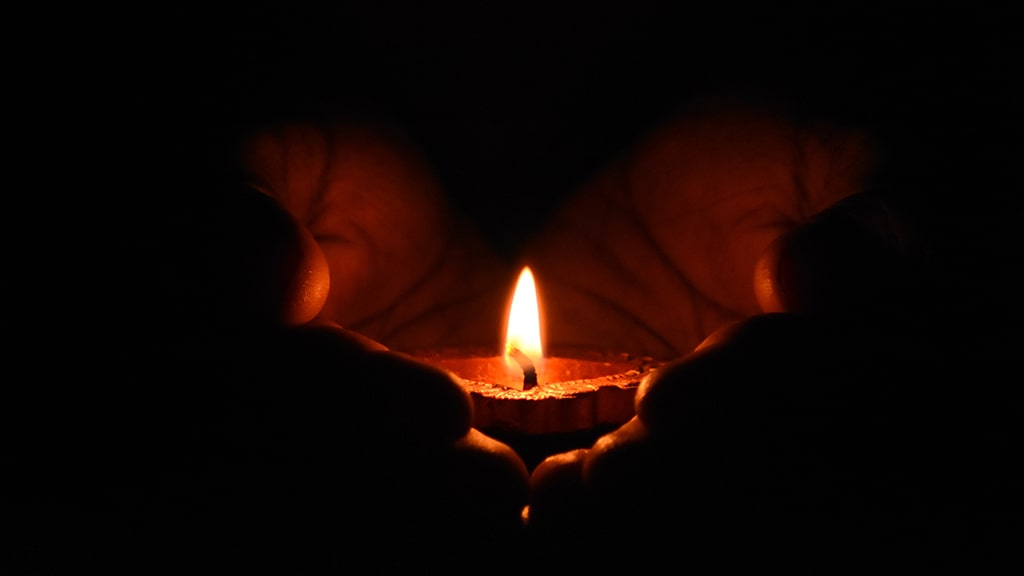grieving

in this program
- signs of complex trauma
- stages of grief
- denial
- anger
- bargaining
- depression
- acceptance
- steps along the way

survival in grief, even eventually building a new life alongside grief, comes with the willingness to bear witness, both to yourself and to the others who find themselves inside this life they didn’t see coming.

Megan Devine

we’ve looked deeply into creating a safe space for ourselves by understanding hyper- and hypo-arousal, managing our window of tolerance, and mindfully bringing ourselves back to a grounded perspective. without this safe space, we cannot yet embark on the journey of healing from trauma. we propose that the second step in healing is allowing the grief of what has been lost. so, what has been lost? by way of answering this question, let’s remind ourselves of the signs of complex trauma.
loss of trust: when a child feels unsafe with their parent, it creates a paradox that the young mind cannot grasp. to be safe, or to regard the adult as safe, the child blames themselves, and becomes ashamed of themselves for feeling what they’re feeling (negative feelings towards the parent), often repressing the latter. in the long run this means the child comes to distrust the world and themselves.
an inability to be vulnerable, or open: the traumatized person feels unsafe in sharing their experience because they anticipate negative responses from others. they’ve become used to shock, platitudes, avoidance, and all manner of clumsy and invalidating reactions when they do take the risk of opening up. there is typically a sense that they are not “shaping up to reality as they should,” and deep fear of exposure and being ridiculed, shamed, or worse.
poor decision-making: because the mind has been hurt from a young age, the traumatized person often shows many signs of impaired cognitive development. the results of poor decision-making present in multiple ways in their relationships and livelihood. furthermore, as they tend to isolate or keep their difficulties private, others may have no idea why they act as they do.
abusive behavior: the way we were made to feel as a child often becomes the way we make those closest to us feel. perhaps this is because we’re crying out for understanding and finding that no-one can provide it, and so we evoke the feelings in others, so that they can at least have a taste of our experience. or maybe it’s because it is the only way we can get to the feelings. when we become mindful, we begin to notice our reactivity and difficulties relating in healthy ways, and our shame increases. this is a very delicate phase of our healing, because it can increase our avoidance and put us further outside the reach of love.
dysfunctional emotions and self-regulation: many of us grew up in an age where little was known or understood about emotion and self-regulation. what we learned about emotions was to bottle them up until they explode, as exemplified by our parents. in our adult relationships, we notice severe reactions, feel misunderstood, and misunderstand others, leading to painful schisms and bitterness.
what has been lost is trust, innocence, vulnerability, healthy decision-making, and emotional processing. what has been added is abusive behavior and dysregulated emotion. the painful reality of complex trauma is that, if we had it hard as children, we will also have it hard as adults. it is also painful that the symptoms and signs will be most visible in close relationships. this means that people will be touched by our demons, and we will make them suffer. however, in adulthood we can begin to heal the toxic shame, chronic anxiety, dysregulated nervous system, and depression.
for most people who deal with complex trauma there are significant mental health issues. these range from affective disorders through anxiety disorders and into personality disorders. these disorders cause a lot of chaos in one’s life. there is a feeling of being betrayed by ourselves, and deep fear of looking into this hurt self.

initiation, intimidation, stigmatization, isolation, helplessness, and self-blame depend on a terrifying reality of childhood sexual abuse… “don’t worry about things like that; that could never happen in our family.” “how could you ever think of such a terrible thing?” “don’t let me ever hear you say anything like that again!” the average child never asks and never tells.

Roland Summit

stages of grief

grief is just love with no place to go.

Mamie Anderson

most of us may have heard about the stages of grief model by Elisabeth Kübler-Ross. these stages include denial, anger, bargaining, depression, and if we get there, acceptance or integration. it is commonly believed that the stages unfold in a sequential way, but this hardly ever happens. in fact, we can go between stages for a long time, until all the emotion has been processed and we can come into acceptance.
the grief of trauma is not a once-off process. it is utterly unpredictable. one moment may feel crushing and another may give you deeper insight. it can cause major life changes and an ongoing sense of numbness. you may feel isolated from those closest to you and find a bridge of connection with a stranger. if you’re lucky, you will find someone who can relate, or is at least willing to listen without trying to rescue you.
denial
trauma changes how we think about ourselves, other people, and life itself. it essentially takes something away from us, leaving an emotional injury that leads to a breakdown of trust and safety.
denial is a defense mechanism that tries to protect us from emotions that seem overwhelming. we avoid the emotion, and this avoidance prevents the emotion from being processed. safety depends on predictability, and predictability means overcoming chaos. we must be willing to look into the chaos of the trauma, an event or events that nothing in our mental makeup had a frame of reference for. trauma can alter our reality, such that we lose our sense of who we are and how we understand the world. we need to lean into the chaos at our own pace and expose it to careful investigation, unpacking our experience and all the damaging beliefs that have formed as a result of it.
at the stage of denial we seldom, if ever, speak of our trauma. we try to live as if it never happened, attempting to “be like others.” we hide the pain, because we believe that nobody wants to know about it. initially, we may be totally unaware that we experienced a traumatic childhood. or we may have been surrounded by others who experienced the same things we did, thus normalising our experience. we may feel ashamed to admit what we experienced, believing that to speak about it means admitting that there is something wrong with us, or that we are broken. when denial is active we make our trauma unreal by minimizing, playing it down, or distracting ourselves with goals. our motto is something like: “the pain is in the past, and although it sometimes plagues my feelings, there is no point in looking back. i need to focus on what is good.”
to move into the next stage we have to begin to acknowledge all the things that make us different from those around us. where they can relax, and we can’t. where they can hold emotion, and we react. where they bond, and we avoid. we need to develop self-awareness and mindfulness. when those are in place, it is likely that we’ll begin to notice the dysregulated nervous system and the signs of complex trauma. we need to see the impact on ourselves and others. the spiritual actions that will help to take us to the next stage include humility, a willingness to not-know (the mind “knows” that nothing is wrong, so it is able to hold uncertainty), and allowing for insecurity.

nobody wants to remember trauma. in that regard society is not different from the victims themselves. we all want to live in a world that is safe, manageable, and predictable, and victims remind us that this is not always the case. in order to understand trauma, we have to overcome our natural reluctance to confront that reality and cultivate the courage to listen to the testimonies of survivors.

Bessel van der Kolk

anger
i was cheated out of knowing a happy and secure childhood. i was scared, i had to please others and suppress my own feelings. i felt pushed away, abandoned and cast aside. my body was violated, again and again. my brain did not develop the networks for connection and safety. i was alone, afraid, with no one to turn to. nobody even asked what i was feeling. why would i trust you? the ones who hurt me so deeply told me they love me.
when we can no longer hide from the reality, there is raw anger. we have begun the processing of emotion, but the anger we now feel can hold us back. sadly, most of the anger will be processed with the ones closest to us. the people who need to hear the pain are either dead or simply cannot listen, cannot feel with, and cannot love. and there is such rage, about the lost innocence, the lost possibility, the injustice, the shame, and the fear. the unlived life that never was, and the lived life that is often a space of endless despair.

grief never ends. but it changes. it’s a passage, not a place to stay. grief is not a sign of weakness, nor a lack of faith. it is the price of love.

Anonymous

in the angry stage we see the reality and it leaves us reeling. mind allows for the existence of the trauma but calls it an atrocity, or a big wrong. someone or something needs to be blamed, and internal statements like “this did not have to happen, they did…” and “if they would just…” are common. angry and fearful emotions plague us, and interpersonal relationships can be volatile.
the traumatized person is left with questions, and these questions, if clung to, prevent the necessary integration. the first question is “why did it happen?” because it is in the past and we can never fully see the interrelationships, the only possible answer is “it happened.” this question is often spoken in the angry stage. deep sadness and anger must be allowed to process. whatever took place in our childhood is a straightforward fact. it was like that, and it does not need to be like that anymore. there is no way to solve it, change it, deny it, or erase it. if there is redemption, then it is in being free of blame, anger and fear, right now.
to move from this stage, we need to see the destructiveness of our reactivity. we must find space to accommodate the painful reality and begin to make meaning of it, not only seeing it as a wrong, but a fact that we can build on. this allows the angry impulse to be channeled into constructive speech and action, and our discernment evolves.

one way to think of this process of transformation is to think of mindfulness as a lens, taking the scattered and reactive energies of your mind and focusing them into a coherent source of energy for living, for problem solving, for healing.

Jon Kabat-Zinn

bargaining
the second question that can hold us back is “what if?” “what if i did something different, or said something different.” “what if we just didn’t go there on that day.” when we look deeply at this question it is clear that we want to bargain with life. we want to change the past. in the stage of bargaining, truth feels overwhelming. we give in to magical thinking and want to bargain with God or life. “i’ll give up… to be normal,” “from now on i’ll do such and such, and then i’ll be free of problems.”
if we want to heal from trauma, we need to explore vivid memories and intense feelings, remove the cognitive distortions, and integrate the feeling as part of our reality. instead of believing that what happened to us was somehow due to our badness (distorted thought), we come to realize that conditions were outside our control, and we are still a worthy person, even though things were difficult.
if we are able to navigate this stage we move into depression, because we can at last begin to feel the feelings that have been kept unconscious, and these feelings are also overwhelming. we see how we’ve clung to anger and bargaining, and sometimes still do. the denial, anger, and bargaining have now been processed, and we truly see-feel the scope of our hurt and scarring.
depression
the most painful and third question is “why doesn’t anybody fully understand?” “why don’t they get the gravity and the severity of the experiences?” “why don’t they understand that i feel victim to my reactions?” “why can nobody hold me?”
these painful questions have no answer, and if we cling to them we cannot heal. the outcome of these questions in the traumatized mind is often a set of very negative beliefs about self, others, and the world. “i’m tarnished, broken, scarred, unworthy, and maybe even deserved what happened to me. people are not trustworthy and cannot understand me. the world is a dangerous place.”
if we allow reality to really sink in, we find that beyond or behind the anger there is tremendous sadness. what has been lost cannot be regained. the life we had is the one that needs to be accepted. there was no joy there, and there is no joy here either. we now acutely feel what has been lost, even whilst realizing that our fantasies about it are just that, our fantasy. there is nothing real to hold onto. nothing to build on. there is just brokenness and pain. the fact that nobody can really ever fully understand has not yet come home. the perspective of “i understand, and that is enough” still needs to develop.
in the stage of depression we have given up the fight on the outside. we turn to our feelings, and because they feel overwhelming we de-press them. we lose our motivation, our joy, and life becomes gray. if the depression persists and we do not work with it, feelings again become unconscious, often presenting as illness and psychological symptoms. the depressed person may feel exhaustion, be irritable, and experience mood swings or persistent gloom. there is often a lack of activity and a sense of numbness.
the enemy, now, is isolation. even though we may prefer to be alone a lot of the time, healing cannot happen in isolation. the damage was done within relationship and the healing needs to happen in relationship. to know that we can love and be loved takes us three quarters of the way. however, for the traumatized person, connection may initially be too exhausting. we are not yet aware of how we unconsciously set ourselves up for repeated pain, and things only begin to change when we bring mindfulness and emotional intelligence to our relationships. we become more discerning of others, more accepting of ourselves, and choose more healthy relationships.
we move from this stage into acceptance when we begin to allow the feelings, feel the feelings, process the feelings, and integrate these feelings as a part of our lives. we no longer feel wrong, or scarred, and we know ourselves as just another human, with our own rich journey. the spiritual actions that move us along include self-compassion, an increased capacity for self-transcendence, and allowing deep rest from insistent thought (meditation).

traumatized human beings recover in the context of relationships: with families, loved ones, AA meetings, veterans’ organizations, religious communities, or professional therapists. the role of those relationships is to provide physical and emotional safety, including safety from feeling shamed, admonished, or judged, and to bolster the courage to tolerate, face, and process the reality of what has happened.

Bessel van der Kolk

acceptance
we come into acceptance by realizing that when there is grief, we only need to grieve. it is simply what it is. we may never get over it completely, and so what? even when there is grief, there can be the allowing of life. this moment can be truly beautiful, despite the background of grief. we gain the deepest perspective of a life that had traumatic beginnings. here we see that, if given a choice, we would not really choose something different, because it would lead to not being who we are. here, we notice that our pain has led to some beautiful outcomes. here, we come home to ourselves. we know that all experience is sacred, and that a different experience is not better or worse. it is just different. there is a place for our difference.
with acceptance comes peace. unfortunately, it doesn’t happen all in one go. we go back and forth between the stages of the grief again and again. our task is to integrate the feelings, sensations, and memories. when we do, we see new possibilities, like a new green plant, stretching out from a blackened landscape. we now have insights about ourselves and we know that there are many like us. we can once again say “yes” to circumstances and are willing to let go of the old. we remember the loss but without despair. we are deeply appreciative of the journey and the learning we’ve had. we respond to our dark life, with all its hidden corners, with acceptance, value-based actions, and sometimes even joy.

recovery from trauma involves the restoration of executive functioning and, with it, self-confidence and the capacity for playfulness and creativity.

Bessel van der Kolk

steps along the way
in his book, The Body Keeps the Score, Bessel van der Kolk calls the remembering an unbearable heaviness. trauma robs us of feeling in control or in charge of ourselves. we must reestablish owning our body, mind, and sense of self. this means feeling free to know what we know, and to feel without being overwhelmed, enraged, or ashamed. we need to work our way back to being calm with images, thoughts, sensations, and sounds that remind us of the past. we need to learn to be fully present and engaged with people in our life. we must find a way of speaking our trauma, rather than keep secrets, and find a way to hold our own hand, so that we can keep talking. things feel unsayable because the traumatized inner child re-experiences the trauma, and the mind cannot register anything but danger, whether actual or perceived. even when we are close to another in relationship, and feel safe, this child can get triggered. in many cases, arguments have nothing to do with our partner or the current situation, but are about stuck points, memories, or triggers from a long time ago. the trigger was already inside us and has little or nothing to do with what is happening currently. it takes a while to learn to hold our own hand and to trust ourselves.

the conflict between the will to deny horrible events and the will to proclaim them aloud is the central dialectic of psychological trauma.

Judith Lewis Herman

for most of us it will be necessary to find someone we trust enough to help us hold our feelings and listen to the painful images and sensations from our emotional brain. we may need a guide, a friend or a therapist who is not afraid of the intense feelings and can contain our darkest anger. someone who can hold our wholeness, whilst we explore the fragmented aspects we had to keep secret for so long. it may take a lot of work to get there.
learning how to breathe calmly and support the hyper-aroused brain, even when we are caught in painful memories, is essential for recovery. at the core of recovery is self-awareness, and this self-awareness rests on the part of our brain that allows us to feel what we’re feeling. this is called interoception, or looking inside. most of the time we’re focused outside, but this does not help us self-regulate. the only way we can heal is by noticing what is going on inside and befriending it, not blaming or chastising ourselves, but getting to know the experience and working with it (stepping into relationship with it).
mindfulness helps us to notice our reaction (annoyance, anxiety, anger, etc) and immediately allows us the perspective to alter our habitual and automatic reactions. mindfulness also gives us insight into the transient nature of experience. when we are aware of our bodily sensations, we are connected to the ebb and flow of emotion, and we develop the ability to hold emotion. we can tolerate a lot of discomfort if we become aware and keep our attention on the body’s constant shifting of states.
recovery from trauma means reconnecting with our fellow human beings. for this reason it is also more difficult to treat trauma that happened during early childhood than trauma that happens later in life. if children aren’t raised by people who can understand and love them, they simply shut down and stop feeling. this gives rise to dissociation, despair, addictions, and chronic illness later in life. for these people, the promise of closeness evokes deep seated fears that revolve around being hurt, betrayed, or abandoned. toxic shame plays a deep part in this. our belief is: “if i let you in, you’ll find out how broken i am and reject me” and this belief can also take a long time, and many reparative relational moments, to shift.

grief can be the garden of compassion. if you keep your heart open through everything, your pain can become your greatest ally in your life’s search for love and wisdom.

Rumi


